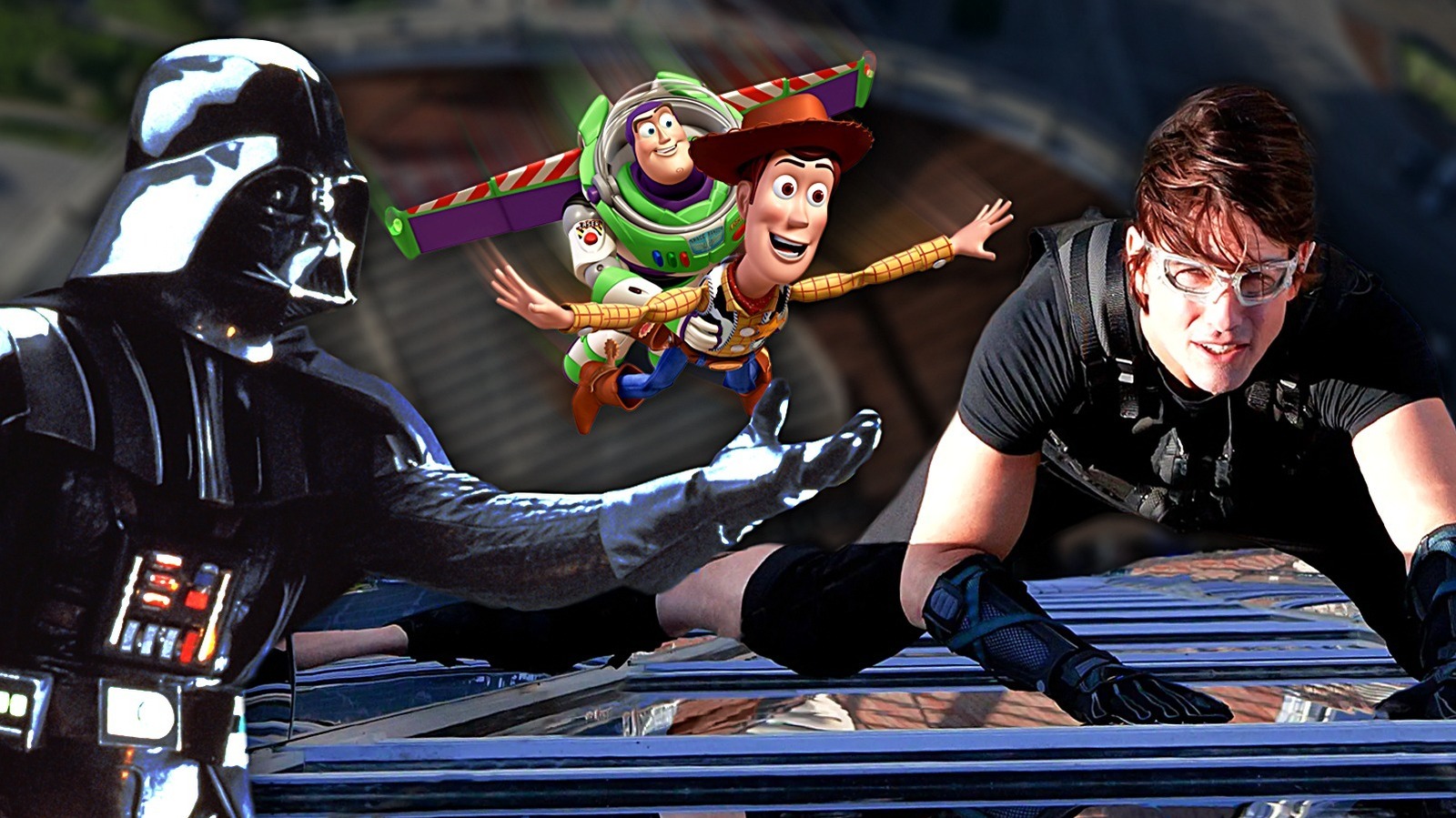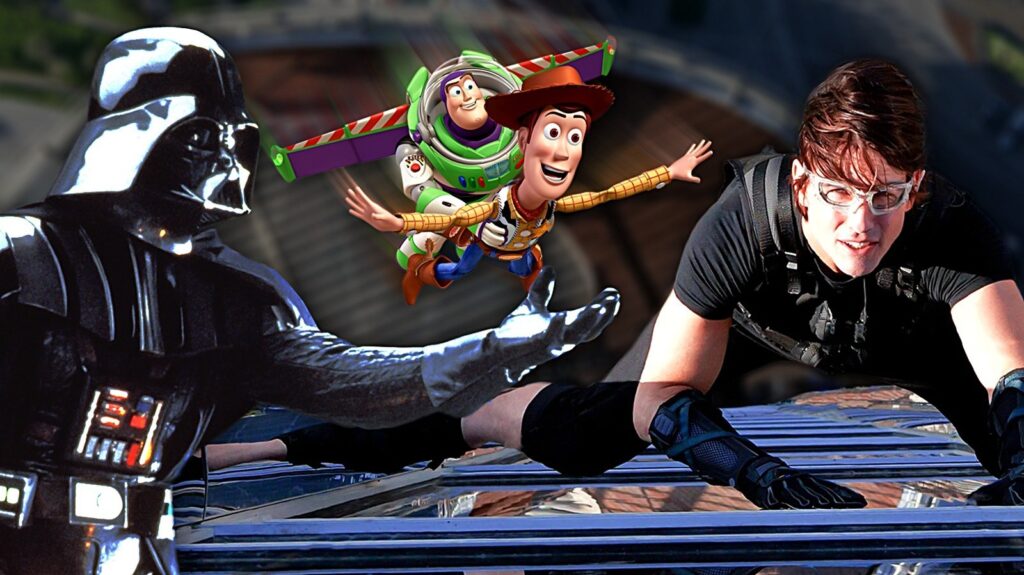
In case you haven’t heard, Christopher Nolan’s deeply heartfelt space drama, “Interstellar,” was recently re-released in IMAX to celebrate its 10th anniversary, and it has become a box office hit all over again. Upon its announcement, the film’s entire one-week-only run quickly sold out across 166 screens, grossing a higher per-theater average than box office juggernauts like “Wicked” and “Moana 2.” Tickets became so hard to find that they were being scalped and price gouged on the secondary market, like cinema’s Taylor Swift. In response, IMAX has since extended the run twice over, capitalizing on the film’s strong word-of-mouth and turning it into one of the year’s must-see films… again!
The return of “Interstellar” proves why IMAX is the future of filmgoing. The company is estimated to earn over $1.2 billion in revenue this year, somehow surpassing their unprecedented $1.06 billion gross from 2023 (everyone say, “Thank you, ‘Oppenheimer!'”). However, it isn’t just IMAX that is bringing in the big bucks. Legacy re-releases of all kinds have become essential for the theatrical market since the pandemic, grossing over $90 million collectively in 2024 alone. It’s no surprise that despite conventional wisdom that “movie theaters are dying,” folks love watching their favorite movies on the big screen. That has us asking one thing: What films deserve the IMAX re-release treatment in their next go-around? Here are 12 humble suggestions of movies that should be re-released on IMAX, many of which are also celebrating anniversaries in 2025.
Inception
As we lovingly joked earlier, Christopher Nolan has been a champion for the IMAX format. Ever since “The Dark Knight,” he has shot some portion of his films using IMAX cameras –- films like “Dunkirk” and “Oppenheimer” saw particularly successful IMAX 70mm releases -– so it would only make sense to continue Nolan’s hot streak with another opening of the vaults. To start, we think it’s only fair to first do right by the last Nolan film to be re-released, “Inception.” The film returned to theaters in 2020, however it was only revived to help bolster the release of “Tenet,” which was delayed due to that dastardly COVID-19 pandemic.
International markets wound up gifting “Inception” a 10th anniversary present of around $9 million (China and Japan alone made up nearly half of that), however, the American response was rather muted, as lockdown restrictions had not yet been lifted in most parts of the country. Now, as we approach the film’s 15th anniversary, it’s time to give folks a second chance to show up for “Inception,” a film that, despite not being shot using IMAX cameras, had a very successful IMAX release back in 2010 and would surely be mesmerizing to revisit on the big screen. With its massive dreamscapes and blaring sound design, the film could easily absorb audiences all over again and inspire another massive box office response.
Apollo 13
It’s easy to suggest that the success of “Interstellar” should herald more space dramas re-released in IMAX. However, Ron Howard’s “Apollo 13” is a special case. The film, released in 1995, was the first live-action film to be remastered using IMAX’s Digital Remastering process, also known as DMR, back in 2002. This process took classic films and blew them up to IMAX’s much larger screen using grain reduction. The remaster received mixed reviews, in part because the film needed to be cut down by 24 minutes in order for its physical film reel to fit within IMAX’s then-smaller projection platters.
Now that we’re approaching the film’s 30th anniversary, it’s time to bring “Apollo 13,” in its entirety, into the modern day with a new remaster. Howard’s film is a stunning recreation of the eponymous space mission that, according to Howard himself, is meant to be experienced in IMAX. Furthermore, the chamber thriller is full of suspense, elevated by three of cinema’s most charismatic on-screen talents (Tom Hanks, Kevin Bacon, and Bill Paxton, who all experienced real zero gravity scenarios) flexing their dramatic chops, which would benefit from a theatrical experience. The re-release could even reunite Hanks and Bacon — as well as co-stars Gary Sinise, Ed Harris, and Kathleen Quinlan — for a potential Q&A, during which they could properly pay tribute to Paxton, who died in 2017.
First Man
Yeah, yeah, it’s another space drama, but hear us out: Damien Chazelle’s “First Man” has long been due for cultural reappraisal. It received a strong response from critics and a solid enough response from audiences, yet its underwhelming box office performance (along with an accompanying controversy over its omission of Amstrong planting the American flag) threw it under the rug. The film deserves a second chance to wow audiences, which could go hand-in-hand with a first chance at filling IMAX theaters. Though the film’s moon landing sequence was shot on IMAX 70mm film (and the film premiered in Toronto on an IMAX screen), “First Man” never saw a theatrical rollout in the format. Anyone who has seen the third act knows that it deserves to be an IMAX experience.
Though its sense of physical or emotional scale never reaches “Interstellar” levels, “First Man” is still anchored by a thoughtful character study of Neil Armstrong (Ryan Gosling) as he assesses his own morality after the death of his daughter from a brain tumor. Though the old-fashioned drama never fully takes flight (according to our own Chris Evangelista’s review), it nonetheless culminates in a strong emotional catharsis with the powerful image of Armstrong throwing his daughter’s bracelet in a moon crater. It’s a moment of quiet closure, one that, despite seeming one small step on paper, feels like a giant leap when shown on the largest screen possible.
Mission: Impossible – Ghost Protocol
In our era of intellectual property saturation, only one series feels like it’s actually still getting bigger and bigger with every new installment: “Mission: Impossible.” Tom Cruise’s absurdly dangerous yet gleefully exciting penchant for death-defying stunts makes for cinema that continuously raises the bar especially when experienced at the scale of IMAX. In honor of the release of “The Final Reckoning,” which may or may not be the final outing for Ethan Hunt, audiences deserve a chance to reminisce and witness the series in IMAX all over again, preferably beginning with the first M:I feature to be shot using IMAX cameras, “Ghost Protocol.”
Directed by Brad Bird, “Ghost Protocol” ushered the M:I film series into a new era, one that brought gravitas to the series after its third entry garnered mixed reviews. Bird pushed to shoot part of the film in IMAX (approximately 30 minutes worth) and release it early on IMAX screens, which gave the series’ intense stunts a much needed glow up. Hunt climbing the Burj Khalifa is now considered an iconic image in the franchise’s history, and though the stunt itself is a clear step up from anything the series had seen prior, a large part of its effect on audiences came from its use of IMAX. To experience that on a proper screen would effectively pay tribute to a series that revels in the potential of the format.
The Empire Strikes Back
In a shocking turn of events, the original “Star Wars” trilogy has never been properly remastered for IMAX. In fact, they are rarely ever shown on IMAX screens at all. George Lucas passed on the chance to make early IMAX history when the original “Star Wars” films were shot and his intense control over the negatives has subsequently excluded them from undergoing IMAX’s DMR process. With “The Empire Strikes Back” approaching its 45th anniversary at light speed, surely we can do justice to one of film’s most storied sagas by rendering its greatest chapter in the world’s most beloved high-premium format. We’ll even take the 4K digital versions if you have them, Disney! Just give the people what they want!
History indicates that audiences can’t get enough of “Star Wars” in IMAX. “The Force Awakens” broke the record for the fastest IMAX film to gross over $200 million globally, while the recent IMAX re-release of “Rogue One: A Star Wars Story” in August 2022 bumped the film into the Top 10 highest-grossing films ever released in the format. There’s no reason to believe hardcore nerfherders wouldn’t show up for “Empire” in droves. However, more importantly, this IMAX re-release would give an entire generation of lucky souls the chance to witness the sci-fi masterpiece for the very first time in the highest possible quality, something not even the most incessant “Star Wars” fans can claim.
Blade Runner 2049
Going back to bombs that deserve another shot, let’s talk about “Blade Runner 2049.” The film was always too good to be a box office hit, however, producers Warner Bros. and Alcon Entertainment have a chance of recouping some of their investment now that the film’s reputation has exceeded its underwhelming box office performance. Denis Villeneuve’s long-awaited sequel was considered a sci-fi masterpiece right from the jump, even on par with Ridley Scott’s original cult classic, though the film’s high user rankings across several aggregate sites suggest “2049” has found an audience on streaming. This can likely be attributed to Villeneuve’s newfound fame after directing the “Dune” franchise, a set of box office hits that have earned him the trust of sci-fi diehards everywhere.
If “2049” were to be re-released in IMAX, new fans would surely jump at the opportunity to finally see it in all of its glory. Roger Deakins’ moody, color-soaked cinematography (for which he finally won his first, long overdue Academy Award) is utterly transfixing, in part because he directly oversaw the film’s IMAX mastering after feeling dissatisfied with DMR. Furthermore, Villeneuve is similar to Nolan in that he is a champion of large-format, going so far as to give “Dune: Part Two” a coveted IMAX 70mm release. Cinephiles will unequivocally band around him the same way they did for Nolan and make this another must-see event.
Lawrence of Arabia
One of the great benefits of IMAX is that it brings a sense of scale to the moviegoing experience that at-home viewing could never replicate. Films feel bigger in the format -– not just physically but spiritually. This is why it’s so important for the format to be not just reserved for modern blockbusters but also the masterworks of yesteryear. “Wizard of Oz” got an IMAX 3D conversion in 2013, while “2001: A Space Odyssey” celebrated 50 years with an IMAX re-release in 2018, including select showings in 70mm. These screenings help keep seminal works in film history at the forefront of modern moviegoing when streaming and smartphones can sometimes make them feel expendable.
“Lawrence of Arabia” is a film that has befallen this fate. Certain streaming company CEOs would have you believe you can simply watch the film on your phone and call it a day. Those who have seen David Lean’s desert epic on a big screen can attest that its gorgeous landscapes and patient tonal gravitas is best experienced on the biggest screen possible. It deserves to be brought to IMAX for the first time, perhaps even in a style harkening back to its original roadshow release in 1962. If “Lawrence of Arabia” is made the exciting experience it always has been, its place in cinema history can be newly affirmed for moviegoers everywhere.
Spirited Away
You didn’t think we were going to ignore animation, did you? After all, the first film to be shown in IMAX was Disney’s “Fantasia 2000,” and animation has been a staple on IMAX screens ever since. It would only be right to include some in our wishlist, but while many would go straight to the Disney Vault for ideas, the works of Studio Ghibli feel more due for the IMAX treatment. We’ve seen plenty of flicks from the Mouse House in large-format, and “The Boy and the Heron,” Hayao Miyazaki’s most recent film, brought Ghibli into the format for the very first time. In fact, IMAX screenings represented 20% of the film’s opening weekend box office gross -– Miyazaki’s biggest in the US to date -– suggesting audiences believe his fantasy epics thrive in large formats.
When deciding which Ghibli film to remaster first, there’s one clear answer: “Spirited Away.” It is widely considered Miyazaki’s most beloved film, the perfect blend of his sensitive coming-of-age nuance with the wondrous, if terrifying, world of Japanese folklore. For many, it was likely the first anime they ever saw, in part thanks to its Disney-led distribution, so an IMAX re-release would be a perfect way for fans to revisit the film in a new way. In a perfect world, this would usher in a wave of re-releases for the entire Ghibli library, as is deserved.
Mad Max: Fury Road
When the opening weekend box office of “Furiosa: A Mad Max Saga” fell far behind its predecessor, “Mad Max: Fury Road,” a lot of folks were surprised that the passionate following for the latter did not translate to a winning weekend for the former. After all, George Miller’s 2015 rampage of a movie is widely considered one of the greatest action films ever made. However, if you ask us, ten years is a long time. The 24-hour news cycle has us forgetting things as soon as we learn them. An easy, not to mention financially rewarding, way to remind people would have been to re-release “Fury Road” in some capacity. However, somewhat incredulously, nothing was put into motion.
As a result, Miller’s planned follow-up to “Furiosa,” titled “The Wasteland,” may face an uphill battle towards a greenlight. However, we think there’s a way to rev the “Mad Max” fandom’s engines back into high gear and prove there’s still juice left in this franchise. Now that we are approaching the 10th anniversary of “Fury Road,” let’s bring it back to IMAX! The film’s high-octane action, sand-soaked production design, and head-banging metal score were prime for the IMAX experience back in 2015, and much like Max Rockatansky across all of these films, it likely hasn’t aged a day. Just lose the 3D this time around.
Fall
Hey, remember when Lionsgate released “Fall,” the comparatively low-budget thriller (which wound up being a canary in the AI coal mine) that managed to eke out $22 million worldwide, over four times its production budget, amidst a still-struggling pandemic box office in 2022? The film, which follows two women who are left stranded atop a 2,000-foot-tall broadcasting tower, hit streaming the near year and became a chart-topper on Netflix internationally, which led to a sequel being announced not long after. It’s a classic case of strong word-of-mouth by element of surprise, and the high-concept makes it an easy sell. However, the film’s minimal presence in the zeitgeist kept it low-profile enough that its genuinely terrifying suspense and impressively immersive visuals could sneak up on unassuming audiences.
What most folks don’t know is that the film was shot entirely with IMAX cameras, but China was the only country that released it in the format, likely due to Lionsgate’s cautious pandemic rollout of the film. This humble hit could capitalize on its unexpected success and become an even bigger blowout if it was re-released in IMAX, as it was meant to be seen. The format occasionally showcases death-defying documentaries, such as the treacherous rock climbing doc “Free Solo” and the Sundance-selected “Skywalkers: A Love Story,” but “Fall” combines that appeal with the power of pulse-pounding narrative. It’s time to bring genuine thrills back to the movies.
Toy Story
Pixar, arguably everyone’s favorite animation studio, has embraced the IMAX format by developing new technology for newer releases like “Lightyear,” but select folks may have caught the “Incredibles” duology in IMAX for one night only back when the sequel debuted in 2018. Though the animation felt a tad dated when blown up in the format -– especially in comparison to the heights Pixar reaches today –- it still felt gratifying to watch the original film’s massive scale and brilliant attention to detail realized in a format worthy of its ambition. It’s high-time the entire Pixar catalog is given the same silver-screen treatment, and we know just where to start.
Though the debate is never-ending, it might be fair to call the original “Toy Story” Pixar’s most universally beloved film (though “Ratatouille” and “Inside Out” probably come close). Coincidentally, it’s celebrating its 20th anniversary in 2025, so why not blast it into IMAX for a re-release? Sure, the animation shows the film’s age. In fact, it arguably does so more visibly than any other early Pixar feature. However, the love for the film’s characters and story far outweighs any primitive character design or overly plasticine textures. There’s even a charm to it, one that has since inspired a treasure trove of versatile memes. Either way, by the time Buzz and Woody are flying in style with the glory of IMAX, all would surely be forgiven.
King Kong (2005)
As the MonsterVerse rages on to new box office heights with each entry, it’s time to pay respects to its elders, specifically Peter Jackson’s visionary remake of “King Kong” from 2005. Despite the film sitting in the shadow of the director’s “The Lord of the Rings” trilogy, it maintains a passionate following and continues to be re-evaluated year after year as a masterful remake. It does exactly what a remake should do: capture the essence of its predecessor while adding new dimensions that bring greater meaning to the material. From Andy Serkis’ gorgeous motion capture performance as Kong to the sheer scale of both the practical sets and the visual effects, Jackson’s remake feels like a “King Kong” for the “Titanic” generation. Let’s cement it into the modern cinephile pantheo,n and give it the IMAX release it never got.
Around the release of “King Kong,” IMAX was still in its formative years. Amidst the film’s bloated production, Jackson surely didn’t have time to create an IMAX transfer for his 35mm-shot film. Now, it feels like a shoe-in for a proper blow-up. Witnessing the wrath of Kong in IMAX would harken back to the unbelievable feat of imagination that was the original film, something that inspired Jackson to create the remake in the first place.


